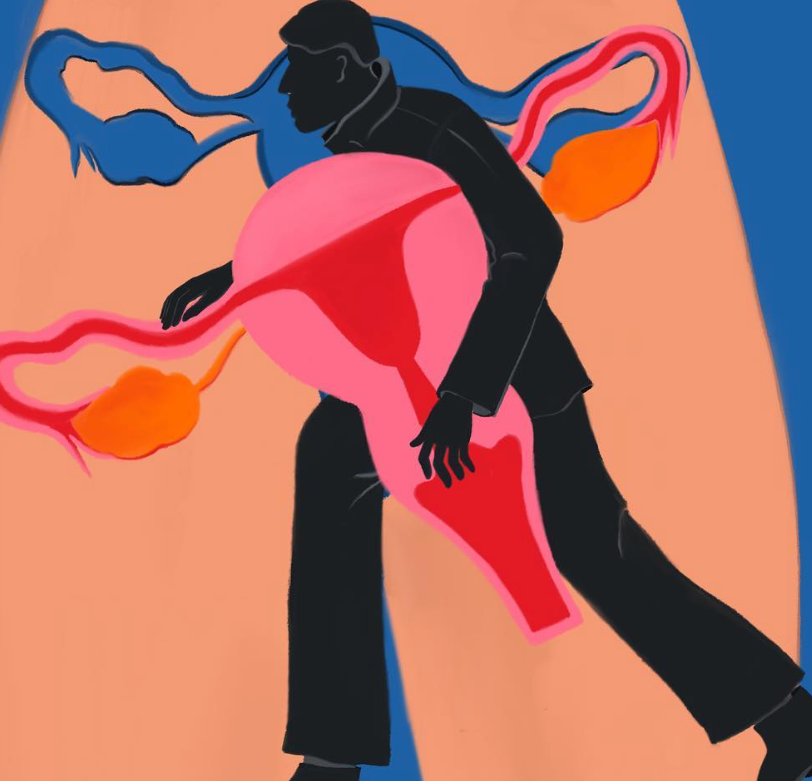ancient abortifacients, reproductive coercion, and bad translations
So... if this this "bitter water" induces pregnancy endings?? How would we understand this whole scenario?

This is Life as a Sacred Text 🌱, an expansive, loving, everybody-celebrating, nobody-diminished, justice-centered voyage into one of the world’s most ancient and holy books. We’re working our way through Numbers these days. More about the project here, and to subscribe, go here:
Today we're getting into an episode that's – well, loaded and fraught.
The "trial of the suspected adulteress." The Sotah ritual, as it's called in Jewville. Sotah means "She who has turned away;" (implied: from her husband.) (Never mind that she's been given this name and yet we have not yet determined her innocence or guilt!)
Before we go there, a reminder that I've gone indie, an am now on a 100% Nazi-free platform! If you've been debating about whether or not to go up a subscriber level, let this be a reminder that the only way these Monday essays happen is with subscriber support. If you are a subscriber already: Thank you, thank you, thank you. And, as always, if you want into the Thursday House of Study but paying isn't for you right now, email LifeIsASacredText@gmail.com and we'll hook you up. Thanks to all of you for being here, reading, and being part of these shenanigans. 🌱
So. We've got this story of a married woman suspected of adultery. We don't know if she did it or not! How can we find out? She gets dragged to the Temple, and the priest makes her drink a strange concoction called "bitter waters" that, if she is guilty, will have a strong physical effect on her. (If she's innocent, nothing will happen.)
I'm going to read it in a very specific way. I acknowledge that this reading is somewhat speculative– different Biblical scholars have a few different theories on what's happening, but I see this very clearly in the text and other people agree with me. So.
It's a strange ritual that in many ways does not make sense– but whose meaning is illuminated if you allow for the possibility that we are dealing with (SPOILER ALERT) a case wherein a woman is pregnant and an abortifacient is administered.
Come and learn. (Also, consider your trigger warnings administered, above.)

I'm actually going to begin with the ending and come back around, because a lot of the clues along the way make a lot more sense if you understand the the denouement.
Assume that I'm quoting from somewhere in Numbers 5:11-31 unless otherwise specified.
Let's start by looking at the physical effects.
I'm going to be harping on translation with this whole episode because too many translations have clearly imposed their biases about what's happening into their word choices. The implications for bad word choice here are not only often sexist or downright weird, but there are places where they obscure what may actually be happening in this text! ALWAYS BE SUSPICIOUS OF TRANSLATIONS, my friends. EVERY SINGLE ONE. (Including mine.) (1)
Let me start with a pretty typical translation of the "what will happen if you DID commit adultery, and you drink the bitter waters" talk from the priest:
"God will make you a lament and a curse among your people, and God will give your thigh to fall and your belly to swell. And this cursed bitter water will come to your innards to make your belly to swell and your thigh to fall"...But if the woman has not [had sex with anybody but her husband], she will be unharmed and able to retain seed.
So– you drink a weird water and your... thigh falls? And your belly swells? Sounds uncomfortable, if confusing. Is she getting saggy? Contusion? Learning how to shake it?
▶️ Is this "trial by ordeal" influenced by Hammurabi's Code #132, which demands that if "a finger is pointed" at a man's wife but she hasn't been actually caught, she's supposed to "jump in the river" for her husband?
▶️ Is it all a placebo meant to pacify an agitated husband, who will finally believe his wife when nothing happens?

▶️ Or did these very specific physiological effects described have some connection to something… physiological?
Different people speculate that the waters cause uterine prolapse, infertility, some sort of horrible gastrointestinal thing (though really we seem to be in the realm of repro stuff, hence "retain seed"). What's really going on, here??
Time to play TRANSLATION WHACK-A-MOLE!
Thigh -ירך-well, in biblical Hebrew, this word is often used to refer to genitals–and treated as a euphemism by translators, but just as "fanny" means something very different in the UK than the US, or "bottom" or "seat" or "back" sometimes mean "tush" and sometimes not, – ירך doesn't always mean the top part of the legs! "genitals," could be a more clarifying word choice here. (See: Genesis 46.26; Judges 8.30, Exodus 1:5 and Song of Songs 7.2, eg.(2)
And did that thigh fall/נפל, or is there another way to explain what's happening? Gosh, perhaps we should look at what happens when נפל appears elsewhere in the Bible (Job 3:16, Ecclesiastes 6:3, Psalms 58:9)?
Would you look at that. נפל also means "pregnancy ending."
(3)
That belly/ בטן that swells? Well, it's also used as "uterus" all over the Bible. (Genesis 25:23, Genesis 38:27, Psalms 139:13, Ecclesiastes 11:5, Job 3:10 Job 10:19, Hosea 12:4, Judges 13:7, and so forth.)
What about "innards"/מעה? Well, gosh, also used to mean "reproductive organs" all over the place! (Genesis 25:23, Ruth 1:11, Psalm 71:6, Isaiah 49:1, and also a bunch of places applied to men.)
And seed/זרע? It's so frequently invoked to mean "offspring" as to be ridiculous. It definitely sometimes gets used to mean "semen," but there are other places (Leviticus 12:2, eg) where it's applied to a woman as well.
So. Retranslating:
"God will make you a lament and a curse among your people, and God will make your genitals abort/miscarry and your uterus swell. And this cursed bitter water will come to your reproductive organs to make your uterus swell and your genitals abort/miscarry"...But if the woman has not [had sex with anybody but her husband], she will be unharmed and able to retain offspring.
... a lot less confusing, no?
So... if this this "bitter water" induces pregnancy endings??
How would we understand this whole scenario?

Let's go back to the beginning:
Numbers 5:12 and following:
A man, [any] man whose wife has turned aside and transgressed a transgression to him (4) in that another man has had sex with her unbeknown to her husband, and she has hidden the fact that she became-tameh/became polluted (5) and there is no witness against her—but a fit of jealousy has come over him and he is wrought up about the wife who has polluted herself [implied: consensually]; or if a fit of jealousy has come over him and he is wrought up about his wife although she has not polluted herself–
There's a woman who either... had adulterous sex or... she didn't, but "a fit of jealousy" is coming over the husband. If there were witnesses we'd go straight to the consequences of adultery, but here it's: ? 🤷 ?
So we don't know if she had an affair or not! We use witnesses in Jewish law, because, like, we don't adjudicate based on someone's feels!
So what's going on?? Wouldn't it be more logical if she were pregnant and he wasn't sure if the fetus was his (based on timing or some other thing?) Or he's been away and he suspects that she might be pregnant, or something like that? You'd think there might be something more tangible than, "dude has been listening to Mr. Brightside too many times?" Obviously this is not in the text itself, but given everything we learn about how this ends, it seems more plausible, no?
It would make a lot more sense than, "We're going to allow any abusive dingus to drag his wife to the Temple and make everybody do a complicated, humiliating ritual because he is having a 'fit of jealousy' despite zero proof, what could possibly go wrong??"
Just speculating. My Tina Fey gif at the top stands, regardless. Let's continue.
The man will bring his wife to the priest.....The priest will bring her forward and have her stand before God. The priest will take sacral water in an earthen vessel and taking from the עָפָר אֲשֶׁר יִהְיֶה on the floor of the Tabernacle, the priest will put it into the water.
This bit in Hebrew is usually translated as, like, "from the dirt that is on the floor of the Tabernacle."
Why would he put dirt into the water? Just for the psychological mechanism of humiliation? Maybe?
But Bar-Ilan scholars Nissim Amzallag and Shamir Yona note that עפר has been more recently understood to mean not just dust or dirt, but also metallic ore even if that meaning eventually fell out of use. (See: Gen. 3:14; Isa. 34:9; 41:2; 65:25; Ezek. 26:12; Prov. 8:26 and Job 22:24, Job 28:2 and 28:6).
And the actual phrasing is not that the עפר is "on" the Tabernacle floor, but rather "from the עפר that WILL BE on the Tabernacle floor." They ask, why would the Torah say that the dirt will be on the floor of the Tabernacle? Wouldn't it say "dirt from the floor," or "dirt that's always there" or etc? But if עפר is ore, then it makes more sense– it's referring to materials that aren't always there all the time, that need to be put there for this particular occasion. (6) SO: "The priest will take sacral water in an earthen vessel and, taking from the ore that will be on the floor of the Tabernacle, the priest will put it into the water."
And, we see that the language of "bitterness" is also in future tense in verse 24:
"the water that causes the curse shall enter into her, and become bitter."
Amzallag and Yona note:
The addition of ground copper ore would confer a nauseous and metallic taste to water, but, this fact alone would not justify referring to such a drink as ‘bitter water’. However, ingestion of a substantial amount of copper salts rapidly provokes cramping abdominal pains, nausea, burning epigastric sensations and intense bitterness in the mouth. The expression bitter water may therefore refer not to the taste of the potion, but rather to the rapid consequences of its ingestion.
They summarize:
The "symptoms of copper intoxication fit the main and side effects of the potion precisely as evoked in this text," and induce abortion.
... would you look at that.
Another possibility:
מֵי הַמָּרִים.
It might not be the "water of bitterness." You know what else "מור" is? Myrrh. "Myrrh water." You know what myrrh is? A traditional abortifacient. Prof. Esther Brownsmith has, in fact, argued that this may be what's going on in the text– and my goodness, it's right there, under our noses.

CONTEMPORARY INTERLUDE
Yes, it's quite possible that there is the induction of abortion in the Bible. Right here. Y'all just saw how this explains a whole lot of weird things in this text.
Yes, on one level, this is one fat rejoinder to all the Christian Nationalist theocrats banning abortion in the US. And a reminder that:
1) Abortion has not only long been permitted in Judaism, but is required when the life of the pregnant person is in danger, and Exodus 21 is our base text for that.
2) REPRODUCTIVE COERCION IS A FORM OF ABUSE.
People sometimes focus on the pregnancy termination in this episode, but neglect the lack of consent for the woman (the "Sotah"). She has no agency or autonomy, no say in what happens to her body, her pregnancy. Patriarchy reigns. We must always grapple with the painful stuff in our texts, and this is part of that. (Today's contemporary analogy; note the laughably light sentence given a man who imposed his will on a woman compared to those criminalized for exercising bodily autonomy or supporting others in doing so.)

3) While we're on the subject of stealing bodily autonomy: The Supreme Court is set to rule– this term– on a case about access to mifepristone, a key abortion and miscarriage medication that has been FDA-approved for 23 years and is safer than Tylenol and Viagra. Currently over half of abortions are via medication abortion, which is critical for those who otherwise would not have access.(7)
3) SCOTUS is also set to rule on Idaho's ultra-strict abortion ban this year, and in the meantime allowed it to enforce its current ban–including in cases of (life-or-death) medical emergencies. This is (as are all abortion bans) a clear violation of Jewish religious freedom– most especially of our principle of pikuach nefesh, how saving lives trumps pretty much everything. (Yes, the life of the pregnant person.)
4) This text talks about a woman, but trans men, some nonbinary people, and other people of other gender identities can also get pregnant, need abortion access, and their rights and autonomy must also protected in All The Ways.
Back to the text:
We were setting things up with the priest.
After he has made the woman stand before God, the priest shall dishevel the woman’s head [hair].
That is, to unbind the hair– to undo her braid or bun or remove a covering or something. It's generally been read as a form of public humiliation– which: pretty awful, and absolutely could be the case.
But–if this were connected to a (forced) abortion ritual, then the part where Leviticus 10:6 and 21:10 connect disheveling (פרע– same verb) the head to mourning practices might be relevant. Again, in isolation it may be far-fetched, but this is about looking at the whole picture, and trying to understand what might be happening. This is a possibility.
The priest takes an earthen vessel with water, adds (dirt or copper ore) to it. The priest tells her that if she drinks it and she is innocent, nothing will happen when she drinks from the "waters of bitterness." He gives the whole scary warning we saw at the top about what will happen. And then:
The priest shall put these curses down in writing and rub it off into the water of bitterness.
I know a rabbi who's suggested that the ink in the writing may actually be the abortifacient, here.

Oak galls are a key ingredient in iron gall ink, which is a requirement in Jewish calligraphic ink later on, and are mentioned in the Talmud in various places (Gitt. 19ᵃ; Sabb. 104ᵇ, Shebu. 41ᵇ) and in later literature. The earliest mention of iron gall ink in any literature as far as I know is the Roman Pliny the Elder (1st c. CE), which doesn't mean that it wasn't in use much earlier than that.
And we do know that oak galls been used, historically, as ancient contraception, that they've been part of traditional postpartum care in Arab, Persian, Malay and Indian cultures for "restoring elasticity to the uterine wall" and that both oak teas and astringent pastes (for, the oak galls are highly astringent) are traditional abortion methods.
None of these are a smoking gun, per se, but it's not nothing.
Speaking personally, I'm more compelled by the copper ore theory. But it's an interesting line of inquiry, not mutually exclusive with the other, and I'm throwing it out there in case anyone wants to take the baton and run with it. Let me know what you find?
And then we get back to where our Sotah, our poor woman accused of adultery, is forced to drink, and potentially experience severe physiological consequences.
Which likely involves the forced termination of a pregnancy.
Which may or may not have been the result of an extramarital affair.
(Or which may or may not have been entirely legitimate, ahem!)
Which, if she was pregnant, may or may not have been a pregnancy that was desperately desired.
We don't know.
There's so much that we don't know.
Because her voice is entirely absent, here.
The entire episode consists of men speaking to her, around her, about her.
And I haven't even gotten into the Rabbinic texts on this passage, which are a whole other level of misogyny and pain. (8)

They do not give [the bitter waters] to two suspected adulteresses to drink at one time, so that the heart of one will not be strengthened by the other. (Tosefta Sotah 1:4)
Rabbi Margo Hughes-Robinson wrote,
"I'm always struck by how openly the sages admit that the Sotah ordeal can only be performed with one woman at a time, because if she has a friend, a comrade, she won't be afraid or feel shame– and that's the whole point! I read the text and think, 'Imagine telling on yourself in this way,' to admit that the goal is to create shame. But this is the whole point of reading these texts, to me. That if we read this text we can stand next to the Sotah, and she won't be left alone to suffer anymore. It won't be a secret, and our presence/reading mitigates the shame."
"If we read this text we can stand next to the Sotah, and she won't be left alone to suffer anymore."
Because, the Tosefta implies, her "heart will be strengthened."
We do not know all of the stories that went into the writing of this text into the Book of Numbers. There are so many women's voices that will never be heard.
But in our compassionate reading, and in our determination to better understand what these women really might have experienced, we can bear witness.
And we can do our best to tell their stories with more honesty, more integrity, and with a truth that honors their memories– as we fight for a future that does justice to everyone here, now, today.
Like this? Get more of it in your inbox every week. 🌱
For free every Monday—sign up at the ‘Subscribe now’ button just below.
And you can get even more as part of a community of rabble rousers going deep into the questions and issues, with even more text and provocation, every Thursday.
And please know that nobody will ever be kept out due to lack of funds. Just email lifeisasacredtext@gmail.com for a hookup.
And if you’d like to underwrite one of these donated subscriptions, you can do so by signing up at one of the higher subscription points.
And if it resonated with you, please share this post.
Sending a big pile of blessings and goodness your way. 💕
FOOTNOTES
[1] Translations
[2] Thigh/loins
[3] נפל means "pregnancy ending"
[4] Transgressed a transgression
[5] Polluted / Tameh
[6] Edomites with copper in their sanctuary
[7] Mifepristone
[8] Rabbinic texts on Sotah
Usually I pop in a translation from Sefaria, generally the JPS gender-sensitive edition, and leave as is or make a couple of light tweaks and go on to the next thing. But I have opinions about so many word choices on all the translations I can find. So I'm using the JPS as a base but going in line by line and making many, many changes. Another translations-are-suspect example related to a language that I do not read is from Muhammad Ali Mojaradi, who educates on the harms of de-Islamified Rumi translations. (He has his own book of translations coming out soon, actually. That first link is his IG.) ↩︎
To say nothing of the practice of putting a hand under someone's ירך in various places in the Bible when making an oath to them (eg Genesis 24:2,9; 47:29), which is widely understood to be that you take an oath with your hand under their-- not thigh, but rather making that vow on their most vulnerable body part/ place that is the seal of the covenant (see: circumcision) / place where procreation happens / insert-your-own-theory-about-why-someone's-making-a-vow-on-another-person's-junk-here. But it's generally understood to be not... thigh. ↩︎
Notably, the word for both "abortion" and "miscarriage" in Modern Hebrew is הפלה, which comes from the same root as נפל (even if you don't see the נ, Hebrew grammar is weird, just trust me on this.) ↩︎
I want to note that the verb for "transgressed" is מָעֲלָ֥ה, referring to mis-use of consecrated items. An item consecrated to the Temple is forbidden for non-Temple use. Like if you declare that you're going to consecrate your spoon/bring your spoon to donate to the Temple for sacred use as soon as you get to Jerusalem, you're forbidden from using it for any non-Temple purpose FROM THAT MOMENT ON, even if you're not leaving town for another three weeks. And if you do use it to eat your breakfast cereal? It's misuse/מעילה, meila. A married woman (and/or "just" her sexuality) is regarded as consecrated to a man in the same way that an object is to the Temple, and any use of it outside that framework is seen as miela/מעילה. (Yes, a married man could have a pilagesh/concubine, whereas a married woman who "commits adultery" would be put to death. This inequality is likely due to a combinataion of concerns about paternity and, you know, patriarchy.) The fact that the wife is consecrated to the husband the way something might be consecrated to the Temple is really first seen in this passage in Num 5, but becomes critical in Rabbinic literature. More on that some other time. An optimistic reading is that it's a way of saying that marriage is a holy space (and you can take this metaphor and run with it.) There are grumpier feminist things one could say about it, too. ↩︎
If you read the piece here, you'll know why I hate the word "polluted" as a translation for "tameh", but on another level, in this particular context, it's kind of apt. As the wonderful Rabbi Margo Hughes-Robinson put it once, the word "communicates not only a cultural judgment about the Sotah’s sexuality and ritual literal unfitness to enter the Temple, but also her status as potentially sexually forbidden to her husband, if she has sexually encountered another man. She is presumably then not only ritually unfit, but also unfit specifically for him." Reading this honestly means that we can't strip the patriarchy from the text, and this word is supposed to have a bit of a nasty bite to it, I think. Thanks to the good Rabbi Hughes-Robinson for suggesting "polluted" as a translation choice in the first place. ↩︎
Several things: 1) As Dr. Harry Louis Chaikin observes, copper is used in IUDs even to this day. 2) They've found a tent sanctuary in the copper mining area of Timna (in the Negev desert, in what would have been the Edomites' turf, around the early First Temple era) with crucibles, furnaces, and copper slag within the sanctuary’s inside area– sometimes metallurgy and worship did go together in that time at that place. 3) Amzallag even argues that the Edomites worshipped the same God as the one in the Torah. ↩︎
Two of the studies cited by the Trump-appointed antiabortion activist judge whose initial ruling set this terrifying mess in motion were just retracted by the medical journal that had published them. Ahem. NB: Even if mifepristone is blocked, medication abortion can still be obtained by using misoprostol only, though there are reasons why the mife/miso cocktail is strongly preferred. ↩︎
I do have to say that Rabbi Dr. Sarra Lev's essay "Sotah: Rabbinic Pornography?" in the anthology that I edited (and contributed to) called The Passionate Torah: Sex and Judaism is just smokingly powerful and unsparing, and does not fetishize this episode so much as use contemporary queer and feminist readings to interrogate what choices the Rabbis make in their embellishments of the biblical text, and why. ↩︎

